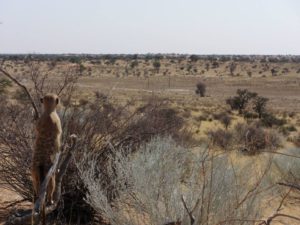 The Kalahari Meerkat Project investigates both ultimate and proximate causes of cooperative breeding in mammals. Longterm data from habituated groups of wild meerkats allow for a variety of empirical questions in evolutionary and behavioural ecology to be investigated at both the individual and population level. Currently, research focuses on the following areas:
The Kalahari Meerkat Project investigates both ultimate and proximate causes of cooperative breeding in mammals. Longterm data from habituated groups of wild meerkats allow for a variety of empirical questions in evolutionary and behavioural ecology to be investigated at both the individual and population level. Currently, research focuses on the following areas:
- costs and benefits of cooperative behaviour
- hormonal regulation of cooperative behaviour
- demographic consequences of cooperative breeding
- communication mechanisms and evolution
- anti-predator strategies
- patterns of decision-making in cooperative groups
The project was founded in the Kgalagadi National Park (formerly the Gemsbok National Park) in north-west South Africa, but was relocated in 1993 to what became the Kuruman River Reserve (KRR).
The project founder, Prof. Tim Clutton-Brock, is Professor of Animal Ecology of the University of Cambridge and is project director together with Prof. Marta Manser Professor in Animal Behavior at Zurich University (Switzerland).
The project is a cooperation of four research groups:
- Large Animal Research Group (LARG), Department of Zoology, University of Cambridge
- Communication and Cognition in Social Mammals Research Group, Department of Evolutionary Biology and Environmental Studies, University of Zurich
- Population Ecology Research Group, Department of Evolutionary Biology and Environmental Studies, University of Zurich
- Global Change Ecology Group, Estación Biológica de Doñana, Spain, Department of Evolutionary Biology and Environmental Studies, University of Zurich
- “Drea Lab”, Departmehttps://kalahariresearchcentre.org/research-publications/zurich-group/nt of Evolutionary Anthropology, Duke University

